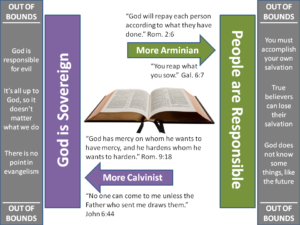Is God sovereign or are people free?
This is a tricky issue. It hasn’t been solved for 500 years so it’s not likely to be solved this week. But I’ve found this visual helpful (PPT file here: Calvin vs Arminius).

The Bible teaches two truths:
- God is sovereign – He is totally in control of everything that happens, including who gets saved.
- People are responsible – Our choices matter, including trusting in Christ and who we share the gospel with.
(A helpful little book that summarizes this is J.I. Packer’s Evangelism and the Sovereignty of God. My visual is an attempt to summarize his point – the truth is in the tension between these two poles.)
It helps to use Biblical terms instead of popular catch phrases. For example, the Bible never uses the term “free will,” but it very frequently addresses the issue of personal responsibility through all kinds of direct commands. The fact that we are commanded IMPLIES that we have “free will,” but that is a philosophical argument not a biblical one. Martin Luther wrote an important book called The Bondage of the Will, against Erasmus (who wrote The Freedom of the Will), who was the father of the enlightenment and was already in Luther’s day writing about the potential within people.
I’ll side with Luther on this one – sinners are not free. They are slaves to sin (Rom. 8:2) and dead in their sin (Eph. 2:1). That is very clear Biblically. We don’t need a little moral reformation to be saved, we need resurrection (Rom. 6:4). The problem with Erasmus as a forerunner of secular humanism and of Arminius as a sort of accidental father to modern liberalism was an over-emphasis on the good inside of people. Luther and Calvin and many who followed them rightly identified the grave danger of underestimating the power of sin, even the remaining sin in the hearts of believers.
Another phrase that is not helpful is “once saved always saved.” The Bible does not use that language. The Bible talks about “to the one who overcomes I will give…” (Rev. 3:21, etc.). It talks about endurance and perseverance. There are no comforting Bible promises for the one who once appeared to be a Christian and now is living in the world with no love for God or the church. There are lots of warnings for such a person (Hebrews 6,10; Matt 13), but no assurance. True believers persevere. Those who don’t persevere have proven that they were not true believers (1 John 2:19; 1 John 3). These explanations show my Calvinist inclinations – mainly because salvation is entirely the work of God, all of His grace. Arminianism shades into giving believers a degree of credit even if just for exercising faith. I see even faith as a gift from God that deserves no merit or credit for us. We were dead, after all.
However, I shade Arminian when it comes to evangelism and outreach. Calvinism can neuter the outreach impulse if we think salvation is entirely God’s work and we have no part to play in it. Good Calvinists always insist that God works through means in both ministry and personal growth. But the implication of a high view of God’s work in salvation is often to downplay the urgency of getting out there to preach. So just as I appreciate the faith and zeal of charismatics in prayer and worship, so I appreciate the missional urgency of Arminians like Billy Graham and Luis Palau. We MUST be active in sharing the Gospel and appealing to EVERYONE without distinction. How can we know who is elect?
